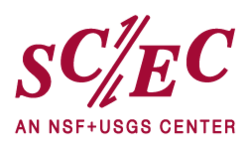 |
Statewide California Earthquake Center (SCEC)
|
| Outline The Statewide California Earthquake Center (SCEC) was founded as a Science & Technology Center on February 1, 1991, with joint funding by the National Science Foundation (NSF) and the U. S. Geological Survey (USGS). SCEC graduated from the STC Program in 2002 and has since been funded as a stand-alone center under cooperative agreements with both agencies, and additional support from other agencies, private foundations, and public utilities. The SCEC community comprises one of the largest research collaborations in geoscience, with more than 1000 active participants on SCEC projects, more than half which participate in SCEC's Annual Collaboration Meeting. SCEC is organized as a consortium of "core institutions", which commit sustained support, and a much larger set of "participating institutions", which join through requests initiated by scientists who wish to participate in SCEC. SCEC's core research program is investigator-driven and open to anyone who is willing to submit a qualified project plan for peer review. The core resources are allocated through an annual planning process that involves input from the entire SCEC community, as well as counsel from an external Advisory Council and the sponsoring agencies. About two-thirds of the SCEC science budget goes to students and early-career scientists engaged in investigator-initiated research. The roster changes constantly as new people and institutions become involved. The Center's working groups, workshops, field activities, and annual meeting enable scientists to work together over sustained periods, building "deep collaborations" and strong interpersonal networks that promote intellectual exchange and amplify the support for students and early-career scientists. SCEC encourages colleagues with creative ideas about earthquakes to formulate them as hypotheses that can be tested collectively. Researchers with new hypotheses are quickly brought together with experts who have observational insights, modeling skills, and knowledge of statistical testing methods. [detail] --> |
|
Members






